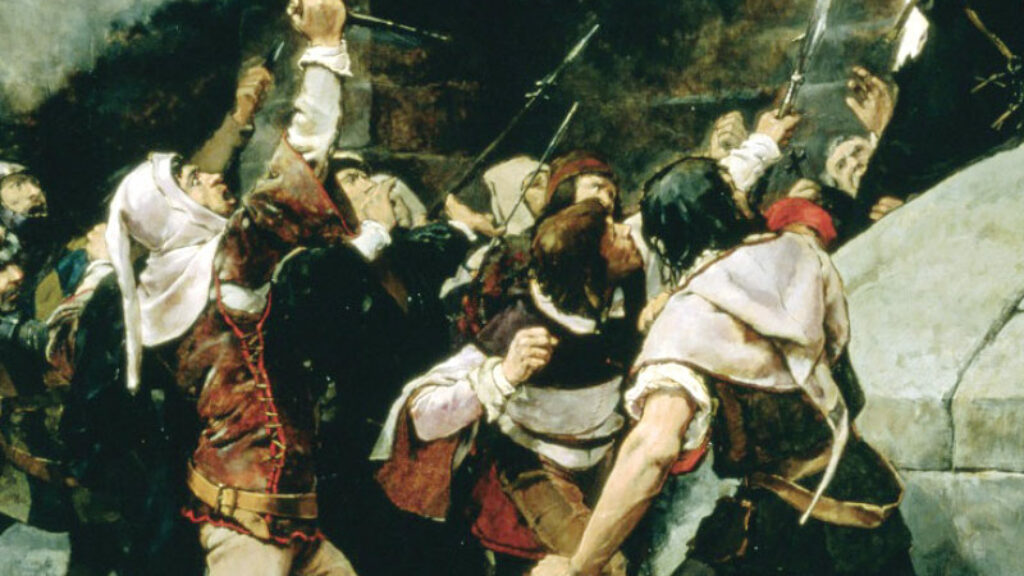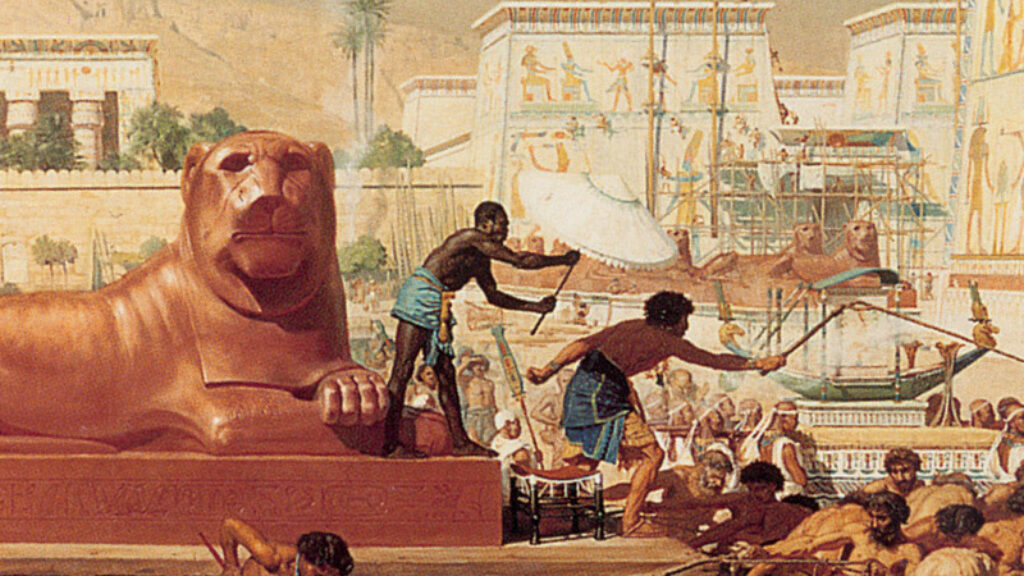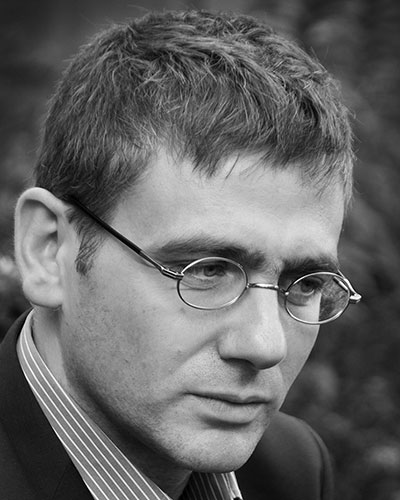Perish the Thought
Bruno Chaouat’s mordantly titled book on how postmodern theorists have responded to the upsurge in European anti-Semitism over the last two decades makes for dispiriting reading. Is Theory Good for the Jews? reviews the ways in which fashionable intellectuals on both sides of the Atlantic have not only failed to grapple coherently with ramifying hatred and violence in their societies, but have often joined the anti-Semitic chorus, especially when Israel is the target. The book’s pathos derives not only from Chaouat’s detailed and morally cogent analyses of a rogues’ gallery of contemporary academicians. It also reflects the admirable honesty with which Chaouat, a professor of French at the University of Minnesota who describes himself as “an unrepentant Theory addict,” asks whether a life devoted to “Theory” may have been a mistake. In the book’s preface he quotes Proust’s famous anticlimax in which the protagonist of Swann in Love muses: “To think that I’ve wasted years of my life, that I’ve longed to die, that I’ve experienced my greatest love, for a woman who didn’t appeal to me, who wasn’t even my type.” Chaouat dares to ask whether, given the moral autism of so many of Theory’s luminaries when confronting the basic political questions of our time, his own romance with it has been a similar waste.
Let us not leave these questions hanging, as Chaouat mournfully does. The answer to the book’s title is straightforward: No, Theory is not good for the Jews (or, for that matter, anyone who cares about intellectual and moral clarity). And, yes, there are probably better ways to spend one’s life than marinating in postmodernism’s silly conceits and tin-eared jargon. And yet, if Chaouat hesitates to draw such un-ambiguous conclusions he has nevertheless performed a service here by chronicling a range of Theory’s recent intellectual and moral failures and how they continue to revolve around Jews, the Holocaust, and the State of Israel. This is worth knowing about since, to adapt Trotsky’s warning, Jews may not be interested in Theory, but Theory is very interested in Jews.
For those who have not spent time in a university humanities department since the 1980s, Theory—also commonly referred to as French theory, postmodern theory, or critical theory—is, as Chaouat puts it, a set of “theoretical discourses permeated by the legacy of Nietzsche and Heidegger,” which includes “deconstruction, as well as structuralism, post-structuralism, and Lacanian psychoanalysis,” in addition to postcolonial theory and more or less distant cousins such as the neo-Marxist writings of the Frankfurt School thinkers. Its totems include Jacques Derrida and Michel Foucault, who have been at least as influential in the American academy as in France or Europe more generally. Theory’s frequent markers are a radical skepticism about the existence of truth and stable meaning in human communication; a conviction that the civilization of the West and the institutions of liberal modernity are not to be significantly distinguished from totalitarian barbarism; a fascination with the supposedly liberatory powers of violence, degradation, and sexual extremity; and a famously obscure manner of expression.
No less characteristic of Theory is its focus on the Jews. As I wrote more than two decades ago, when I was still recovering from Theory’s thrall:
Every major contemporary French theorist has made some study of or pronouncement upon the Jews and their place in the West. This means that in literature and cultural studies [departments], where the influence of French post-structuralist thinkers is so immense, with many of the most widely read works of Theory focusing on aspects of Jewish history and thought, a strange sort of “postmodern Jewish Studies” has become a central part of the scholarly discourse.
I noted then that in this discourse “the Jews themselves become ethereal, reduced usually to a single philosophical principle or merely symbolic value that is put forth as their ‘essential nature.’” A well-known example from that time comes from Chaouat’s famous teacher Jean-François Lyotard, whose 1988 book Heidegger et “les juifs” put “the Jews” in quotation marks to indicate that they are really the principle of semantic and philosophical indeterminacy, that which no system of thought can contain. Lyotard and other theorists, whether Jewish or not, meanwhile seemed to know vanishingly little about the details and actual substance of Judaism and Jewish history. Such abstractions tended more often than not to be nothing other than recrudescences of old tropes and stereotypes (Jew as pariah, Judaism as homelessness, etc.) presented as critical analysis.
Such was the lay of the academic land at that time. Chaouat’s book picks up the story from there, analyzing the utterances of theorists and their fellow travelers since September 11 and the upsurge of violent, jihadist anti-Semitism in Europe. Inevitably, we encounter Berkeley professor Judith Butler, who has been at the vanguard of academic boycotts against Israel and considers Zionism a criminal perversion of Judaism. Chaouat takes her to task for, among other things, her misrepresentations of the philosopher Emmanuel Levinas, whom Butler accused of racism because of an interview in which Levinas maintained that Israelis, like all people, have an ethical obligation to protect themselves and their families from terror. Butler, along with Slavoj ŽiŽek, Santiago Zabala, and Gianni Vattimo, is a contributor to the 2014 volume Deconstructing Zionism: A Critique of Political Metaphysics, which Chaouat shows to contain conspiracy theories about September 11, depictions of Jewish peoplehood as a unique metaphysical evil, and a range of hoary anti-Jewish tropes employed to
critique Israel and exculpate its enemies. The quality of thought therein, momentarily unmasked of theoretical abstractions, may be seen in the contribution of Vattimo, emeritus professor of philosophy at the University of Turin and a member of the European Parliament (and a vocal sympathizer of Hamas). Vattimo expresses his hope that:
The bloody racist politics of the State of Israel have begun to push the American Jewish community—its better part, certainly, starting with Chomsky—to take note that the very praiseworthy and profundity of the Jewish tradition [sic] is only so much putrid, hot air from which one must free oneself in order to avoid spilling blood on account of the Tomb of Rachel, of the Temple grounds, or of the sacred rights of the Jews to the Promised Land.
Writing elsewhere, a disciple of Foucault, Giorgio Agamben, helpfully suggests that both Palestinians and Israelis abjure all national self-determination since, in Agamben’s understanding, peoplehood inevitably leads to Nazism, while the Palestinians today embody the moral ideal of Jewish powerlessness.
This likening of Zionism to Nazism is, of course, a trope that has extended far beyond the theoretical precincts of the academy. In 2010 Stéphane Hessel, an aged Jewish hero of the French resistance who had survived Buchenwald and Dora, published a brief, best-selling screed titled Indignez-vous! (translated into English in 2011 as Time for Outrage!) in which he retrospectively pronounced the German occupation of France to have been “relatively harmless” when compared with supposed Israeli depredations in the West Bank. The book was published in English and helped inspire the Occupy Wall Street movement.
Granted, the Zionists of Israel may be demons in human form, but perhaps these intellectuals have a word to speak on behalf of the Jewish communities of Europe, targets of an ongoing wave of jihadist violence? Alas, Derrida himself, even when interviewed in 2001, was unable to perceive a burgeoning anti-Semitism rooted not in the right but in the anti-Israel left and France’s Muslim population. His student, deconstructionist Bernard Stiegler, meanwhile blames recent massacres of French Jews on, in Chaouat’s formulation, “consumerism, the entertainment industry, and the cynicism of the financial elites.” As Chaouat says, such “sociological ready-made” analysis is “a serious obstacle to understanding the resurgence of antisemitism.” He might also have noted that among anti-Semites themselves, there is little doubt as to who runs the entertainment industry and constitutes the financial elite.
Chaouat shows how various postcolonial theorists justify or ignore Muslim anti-Semitism, seen as a legitimate response to European colonialism. Indeed, as Chaouat writes, a number of French writers are less concerned with Muslim attacks on Jews than on the political threat posed by those European Jews who have shown a willingness to decry anti-Semitism even when exhibited by Muslims, and to defend Israel against those who would see the Jewish state destroyed. In the world of Theory, such dissidence marks these Jews as apologists for imperialism, fascism, and, yet again, an Israeli holocaust directed at the Palestinians.
Chaouat traces some part of these inversions to Theory’s abstraction of Jews and Jewishness into symbols, fungible moral tokens easily transferred into other bank accounts. It is little surprise that intellectuals who see Jews only as deterritorialized outsiders have little use for actual flesh-and-blood Jews, let alone those with a nation-state. But Chaouat also sees an important ideological shift in Theory’s increasing identification of Jews with Nazis, and of Palestinians, Muslims, and other Third World groups with (formerly noble) Jews. Prior to the 1990s, he argues, postmodern theorists tended to celebrate violence and the transgression of liberal norms for their own sake. Georges Bataille, for instance, another of Theory’s foundational thinkers, believed that crucial metaphysical truths were to be encountered in violent limit-experiences, whether joyful and ecstatic or agonized and degrading, but in any case largely unyoked from any practical politics. In contrast to the good old postmodernism, as it were, today’s theorists have taken what Chaouat characterizes as a “moralistic turn.” Rather than championing the kind of amoral aestheticism, beyond good and evil, of Bataille, postmodern theorists now prefer to support projects of resistance and political violence on behalf of what they see as downtrodden groups. If Jews and Israelis, who are now defined as white colonialists or even Nazis, must be thrown under history’s bus as part of this utopian project, so be it.
To which one might respond, isn’t all of this a problem not of Theory but of the radical left more generally? After all, Israel-bashing, anti-Semitic conspiracy, hatred of the West, and crude visions of anti-capitalist revolutions and Third World uprisings may be found in England’s Labour Party as well as America’s English departments. Chaouat does eventually place his subject, albeit passingly, in the context of the global left. Noting Judith Butler’s infamous 2012 characterization of Hamas and Hezbollah as progressive social movements, he concludes:
The radical left, finding itself bereft of yesterday’s proletariat, has now invested its hopes in former colonized peoples and the figure of the migrant. It views current political struggles through the messianic lenses of the past.
Indeed, the anti-Semitism and anti-Zionism of postmodern intellectuals, their fetishization of the Palestinians and violent jihadists, have less to do with new readings of Derrida than with long-standing features of left-wing political ideology. If you believe that liberal democracy is not to be cherished but overthrown, if you believe that moral value attaches not to personal choice but to group affiliation, if you believe that such groups divide nicely into oppressors and oppressed, and if you believe that such oppression is manifest in ever more subtle yet insidiously ubiquitous forms through which the powerful subjugate the masses—then anti-Semitism is likely to be a feature, not a bug, of your world view. If Theory distinguishes itself from other precincts of the intellectual left it is mainly by offering a more rarefied vocabulary with which to express these convictions.
For all his analytical acuity and moral passion, Chaouat leaves the broader historical and philosophical context of Theory’s relation to the left largely unexplored. Similarly, for a book that focuses primarily on academic figures, Chaouat’s analysis is silent about basic features of academic life that would contribute additional understanding to the ideological shifts he treats. Most fundamental in the American context is the virtual erasure of non-leftist faculty from the humanities. Studies show that what had already been a decades-long minority position of conservatives within academia, starting in the 1990s, began to approximate the population density of unicorns. It seems likely that the mainstreaming of anti-Semitism and anti-Israelism is not unconnected to the wildly lopsided political culture of the academy. After all, we are now more than two generations removed from an academic culture that manifested a robust commitment to the norms of liberal democracy and was familiar with the classical texts underwriting this commitment. If, by contrast, the typical ideological menu today mainly offers choices between, say, a Foucauldian or a Derridean radicalism, or between Nietzsche’s or Marx’s overthrow of the West—and you’ve been exposed to little else—it can hardly be surprising if your political judgement becomes a tad skewed.
While valuable and trenchant, Chaouat’s book resembles other recent attempts by left-liberal Jewish academics to push back against their more militantly radical colleagues—for instance, the 2014 volume The Case Against Academic Boycotts of Israel or the recent (and, for the moment, successful) campaign to stop anti-Israel boycotts by the Modern Language Association. One applauds these efforts, but viewed from outside the truncated political spectrum of today’s professoriate they can seem both belated and somewhat pyrrhic: old-fashioned liberals asking their radical colleagues not to be marched off the same gangplank as were their conservative colleagues, and faculty who support Israel’s continued existence pleading for Jewish membership in the club of the aggrieved.
It is a final, telling indictment of Theory that Chaouat’s critique of it derives more political and moral insight from his detours into novels by Philip Roth, Boualem Sansal, and Michel Houellebecq than from any theoretical text he cites. One might have wished that Theory were today solely a matter of 1980s trivia, at most an exercise in period nostalgia like the television show Stranger Things, albeit scarier and less entertaining. Alas, as Chaouat’s book shows, it is still very much with us.
Comments
You must log in to comment Log In
Suggested Reading

Faith and Miracles: Hasdai Crescas’s Passover Sermon
In Hasdai Crescas’s brilliant critique of Maimonides, he replaced the self-intellecting intellect that was Aristotle’s God with the God of Israel, whose essential nature, he argued, was one of unbounded and unfailing love.

Mansions, Museums, and Magen Davids
In building (or rebuilding) grand houses in France and England Jewish immigrants created, brick by brick, edifices within their countries’ histories. Not all would survive World War II.

The Beginning of Politics
Leon Kass hadn't really read the Bible until he found himself teaching Genesis to freshmen at the University of Chicago. Three decades later, he published his widely acclaimed The Beginning of Wisdom: Reading Genesis. Now he’s published his commentary on Exodus.
The Argumentative Jew
The most common understanding of disagreement, in the private sphere and the public one, is that it represents a failure.

ekbmrb21
"Moral autism?" how sad that a post decrying racist and antisemitic stereotypes, which has led to the scapegoating of the Jewish people, the author falls prey to the ugly and evil ignorance about autism. You have dehumanized an entire segment of humanity based upon outdated and uneducated nonsense. These concepts about autistics have been resoundingly refuted and debunked. My two sons, who are autistic, are extremely moral and ethical youngmen. Shame on you for this.